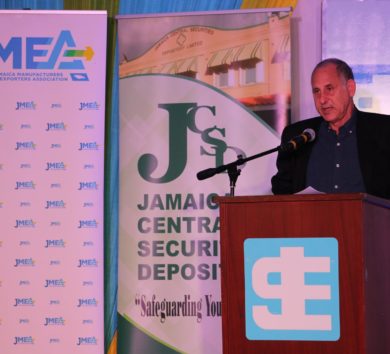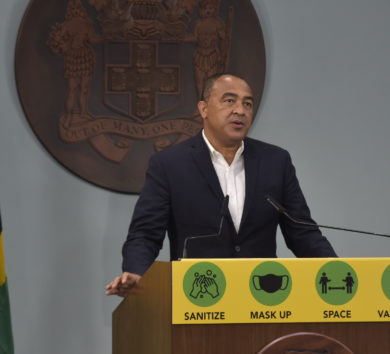

—Article by Dennis Chung
Recent numbers released by the Planning Institute of Jamaica (PIOJ), state that in the April to June 2021 quarter, the economy is estimated to have grown 12.9 per cent. While this is welcome news, it is against the background of a 14 per cent decline in the comparable 2020 period, and an economy that was in decline before.
The main growth comes in the segments of tourism (over 330 per cent) and construction. While these are good signs, it is again against the background of tourism declining 85 per cent in the 2020 quarter and significant stimulus money in construction. One, however, must give commendation to the tourism sector, and Minister Edmund Bartlett, for holding it together.
The more concerning number is the rise in unemployment when compared to April 2019, with the unemployment rate moving from nine to 12 per cent, and almost 30,000 more persons unemployed.
So these numbers tell us two things.
Firstly, that the economy can easily recover to pre-COVID levels, once we have economic activity normalised. And this is good.
It also says that even after the recovery, there will be some lasting damage. How much damage or benefit depends on how we manage the pandemic and what is done to make sure we come out stronger.
The question we need to examine then…Is Jamaica ready for a post-COVID world? Because this will end and we must ensure we are prepared.

I will answer the question up front, and say as we stand right now we are NOT ready for a post-COVID world.
Why do I say this?
What we must first understand is that because of COVID many things have changed in the way we do business and interact with each other. If this change was over a six-month period, then maybe we would have easily gone back to pre-COVID behaviour. However, after happening for one and a half years, I suspect that many of the changes are now institutionalised.
So for example, I suspect that we will see a lot more online commuting and transactions. Many companies will have blended work solutions, with some persons working from home and some going into office.
We will also continue to have online meetings, as these have proven to be just as effective, cheaper and a more efficient use of time. Many individuals may also choose to find jobs where they do not have to commute to work.
This of course means that critical infrastructure will be solid telecoms and internet infrastructure.
This is something that is dreadfully lacking in Jamaica. You can’t go 10 minutes without a cell call dropping, or find that there are many spots where service is not available. Also, the internet service is very unstable and comes and goes just as much as the cell phone service. This is even more so for the home service, and if people are to work from home then this is totally unacceptable.
In addition to the service being abysmal, the cost of both telecoms and the internet is way too high for critical infrastructure in a country where there are so many poor, and it is getting worse, especially with lockdowns.
The result of this is that labour and total factor productivity will fall even further, compounding on our already falling labour productivity. Falling labour productivity is the main cause of exchange rate depreciation and poverty, and as result inflation also. This will result in more poverty.
As an example, I listened to a level-four (of eight levels) nurse on Nationwide Radio say that after 30 years as a nurse her salary has moved (in today’s J$ value) from a basic of around $1.1 million to $1.5 million per annum.

We cannot build countries (or companies) effectively without properly investing in and treating people correctly. To do otherwise will result in short term gain and long term demise. We will (as has happened to us) get to a plateau and remain there…called the Peter Principle in organisational management.
This brings me to another reason for our unpreparedness. This has to do with the ‘collective bargaining’ process we are used to.
We cannot change productivity if persons, or factors of production, are not compensated differently based on performance. So, if the teacher who produces 100 per cent passes gets the same increase as another that produces 50 per cent passes, then eventually they will all produce 50 per cent.
I will mention just five other reasons why we are not ready for a post COVID world, although one can list others.
First, is that COVID has shown that we have an inadequate infrastructure generally, in terms of capacity. Inadequate road network and still too many people relying on physical infrastructures such as the tax office and a large part of the population still unbanked.

Second, we have a far-from-adequate public transport system, which is one of the biggest wins if we can get it fixed and running efficiently. But successive governments seem reluctant to do what’s necessary to have a proper transport system. If this were properly fixed, we would see significant jumps in productivity and a reduction in imports.
The third is that our legislation is way outdated. How can we for example, in the middle of a pandemic, not be able to allow trained pharmacists to administer vaccines because the legislation does not allow it? Or how can we take over 10 years to effect Road Traffic Amendments, which can save lives?
Fourthly, during the pandemic we have not had face to face classes and an estimated 150,000 children cannot be accounted for. This is a major problem for crime and future labour force productivity. Already we had 70 per cent of children leaving high school without one subject. A post-COVID world will require a higher-skilled workforce and we will not be ready.
The last point I will mention is the lack of law and order in society. This results in no order on the roads, such as bad driving and illegal vending. It also results in lower productivity and incorrect socialisation of children, from something like night noise. Not enforcing zoning laws also causes decaying neighbourhoods and lower standard of living, just like the major problem of informal settlements. And the ultimate is the rise in murders.
One solution I will proffer here, with regards to the important requirement for telecoms and internet, is that in a country as poor as Jamaica, the only real solution is that government must own the telecoms and internet infrastructure (just as they own the electricity grid) and take charge of keeping it up to date and in top condition.

It can then allow various operators to access the infrastructure and this way their operating cost will be reduced and we can have more players offering better service and a much lower cost.
In a post-COVID world, behaviour will change. And this means economic and social behaviours will change also. Consumers will expect products and services delivered more efficiently. Businesses will also produce in different and more competitive ways. This requires that infrastructure, legislation and people must be able to adapt.
This is a conversation we must have in preparation. But we cannot just have the conversation (talk and no action), as we are used to in Jamaica.
Dennis Chung is a Justice of the Peace and chartered accountant by profession. He can be reached at [email protected].






Comments